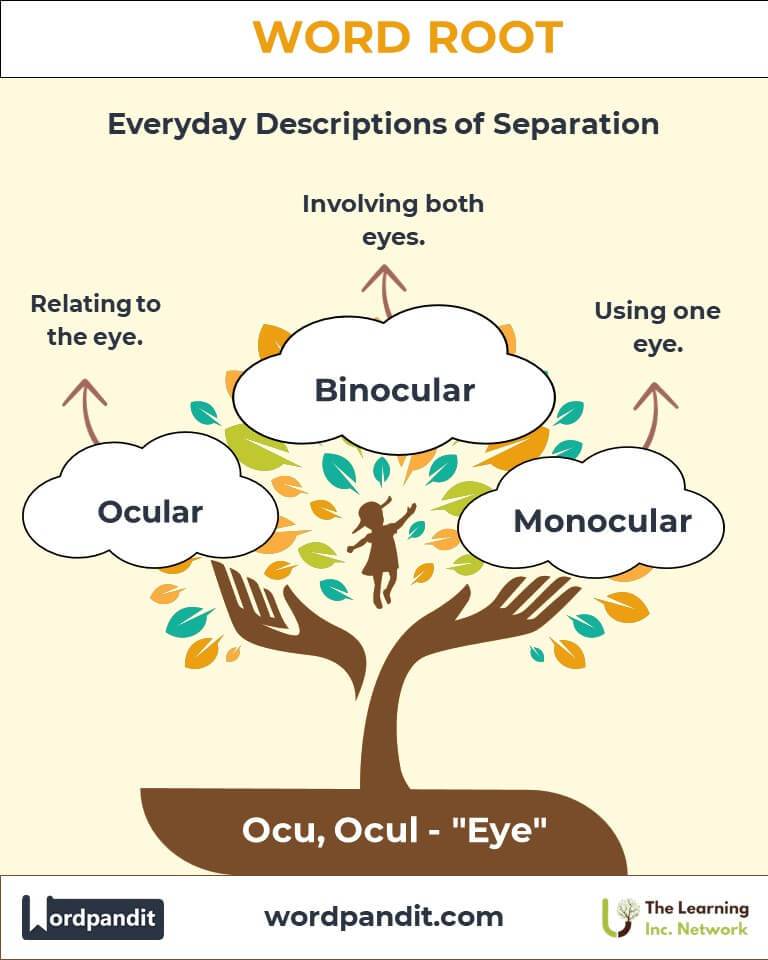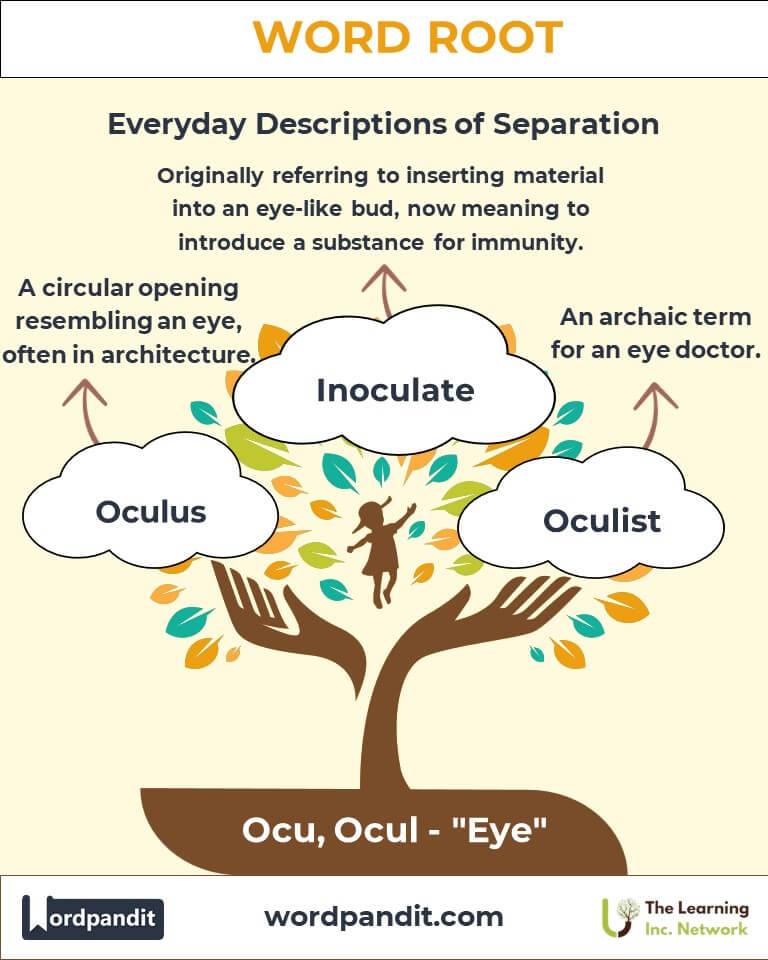Ocu, Ocul: The Window to Understanding Vision and Language
Byline:
Discover the fascinating world of the word roots "ocu" and "ocul," derived from the Latin word for "eye." From terms like "ocular" and "binocular" to specialized jargon in medicine and optics, these roots illuminate the profound ways eyes shape our perception and language.

Table of Contents
- Introduction: The Power of Vision in Words
- Etymology and Historical Journey
- Mnemonic: Unlocking the Power of Ocu and Ocul
- Common Ocu and Ocul-Related Terms
- Ocu and Ocul Through Time
- Ocu and Ocul in Specialized Fields
- Illustrative Story: Ocu and Ocul in Action
- Cultural Significance of Ocu and Ocul
- The Ocu and Ocul Family Tree
- FAQs about the Ocu and Ocul Word Roots
- Test Your Knowledge: Ocu and Ocul Mastery Quiz
- Conclusion: A Vision of Understanding
Introduction: The Power of Vision in Words
How often do we "keep an eye on things" or gain "insight" into a problem? These phrases reflect the centrality of vision in human experience, mirrored in language. The word roots "ocu" and "ocul" (meaning "eye") give life to a host of words, from ocular (relating to the eye) to binocular (involving both eyes). These roots transcend the literal, symbolizing awareness, perception, and focus across disciplines.

Etymology and Historical Journey
The roots ocu and ocul trace back to the Latin oculus, meaning "eye." Over centuries, they found their way into languages such as Old French and eventually English, evolving to describe not only physical sight but also abstract forms of vision, such as insight and foresight. With the advent of the Renaissance, advances in anatomy and optics expanded the usage of these roots in scientific terminology, solidifying their importance in understanding vision and perception.
Mnemonic: Unlocking the Power of Ocu and Ocul
To remember these roots, picture a pair of oculars (binoculars) giving you a crystal-clear view of the horizon. Their lenses focus your attention, symbolizing clarity and perception.
Mnemonic Device: "Ocu and ocul open the eyes to clarity, from ocular lenses to visionary insights."
Common Ocu and Ocul-Related Terms
- Ocular
Pronunciation: ah-kyoo-lar
Definition: Relating to the eye.
Example: "The doctor performed an ocular examination to check for vision problems." - Binocular
Pronunciation: bye-nok-yoo-lar
Definition: Involving both eyes.
Example: "Using binoculars, she spotted a rare bird in the distance." - Monocular
Pronunciation: mah-nok-yoo-lar
Definition: Using one eye.
Example: "The sailor used a monocular telescope to scan the horizon." - Inoculate
Pronunciation: ih-nok-yoo-late
Definition: To introduce a substance, often for immunity, originally referring to "grafting" by inserting into an eye-like bud.
Example: "Vaccines are used to inoculate against diseases." - Oculus
Pronunciation: ah-kyoo-lus
Definition: A circular opening or design, often architectural, resembling an eye.
Example: "The oculus at the Pantheon bathes the interior in natural light." - Oculist
Pronunciation: ah-kyoo-list
Definition: An archaic term for an eye doctor or optometrist.
Example: "In the 19th century, people visited an oculist for vision issues."
Ocu and Ocul Through Time
- Oculist to Ophthalmologist: The term "oculist" was widely used in earlier centuries to describe eye doctors. Over time, it evolved into the more specialized term "ophthalmologist," reflecting advancements in medical science.
- Inoculate’s Dual Meaning: Originally referring to the insertion of material into an eye-like structure, inoculate transitioned into medical terminology, signifying vaccination and preventive care.
Ocu and Ocul in Specialized Fields
- Medicine:
- Ocular Hypertension: Elevated pressure within the eye, often a precursor to glaucoma.
- Binocular Vision: The ability to use both eyes simultaneously for depth perception.
- Technology:
- Ocular Augmentation: Enhancements to vision through technology, such as augmented reality glasses.
- Architecture:
- Oculus: Eye-like openings in domes or walls, integral to classical design.
- Military:
- Binocular Rangefinders: Tools for calculating distance, crucial for artillery and scouting.
Illustrative Story: Ocu and Ocul in Action
As a child, Mia loved stargazing through her binoculars. This passion grew into a career in astronomy, where she designed an innovative ocular telescope system. Her invention allowed for unprecedented views of distant galaxies, fulfilling her dream of bringing the stars closer to humanity’s eyes.
Cultural Significance of Ocu and Ocul
Eyes are often called the "windows to the soul," reflecting their deep cultural symbolism. Ancient myths often attributed divine vision to gods, while modern literature uses "ocular" imagery to signify perception and truth. The roots "ocu" and "ocul" not only embody physical sight but also the metaphysical concepts of understanding and awareness.

The Ocu and Ocul Family Tree
- Opt (Greek: "eye, sight"):
- Optical: Related to vision or light.
- Optometrist: A specialist in eye care.
- Vis/Vid (Latin: "to see"):
- Vision: The ability to see.
- Video: A recording of moving visual images.
- Scop (Greek: "to watch"):
- Microscope: A device for viewing small objects.
- Telescope: A tool for observing distant objects.

FAQs About the "Ocu" and "Ocul" Word Roots
Q: What do "ocu" and "ocul" mean, and where do they come from?
A: These roots mean "eye" and are derived from the Latin word oculus, which translates directly to "eye." They form the foundation of words related to vision and perception.
Q: How are "ocular" and "optical" different?
A: "Ocular" specifically refers to the eye itself or its functions, such as ocular muscles or diseases. "Optical" pertains to vision or light-based systems, such as optical illusions or fiber optics.
Q: What is binocular vision, and why is it important?
A: Binocular vision involves using both eyes simultaneously, which provides depth perception and a wider field of view. It is crucial for activities requiring precision, such as driving and sports.
Q: What is an oculus in architecture?
A: An oculus is a circular opening or design, often in domes or walls, resembling an eye. A famous example is the oculus in the Pantheon in Rome, which allows natural light to illuminate the interior.
Q: Why was "oculist" replaced by "optometrist" or "ophthalmologist"?
A: "Oculist" was a general term for eye specialists in earlier centuries. Advances in medicine introduced specialized roles: optometrists focus on vision correction, while ophthalmologists treat eye diseases and perform surgeries.
Test Your Knowledge: Ocu and Ocul Word Roots Quiz
1. What does the root "ocu" mean?
2. Which term describes using both eyes?
3. What does "oculus" refer to in architecture?
4. Which field commonly uses the term "ocular"?
5. What is an outdated term for an eye doctor?
Conclusion: A Vision of Understanding
The roots "ocu" and "ocul" illuminate the intricate connections between vision, language, and culture. From everyday expressions to scientific advancements, these roots remain integral to how we see and understand the world. As technology and knowledge evolve, so too will the legacy of these powerful word roots, opening new windows to understanding.












